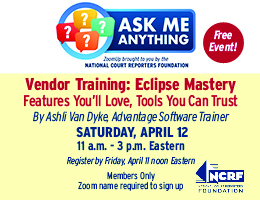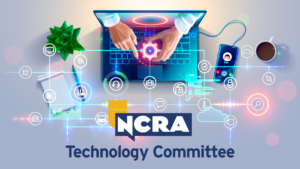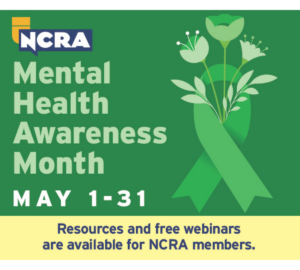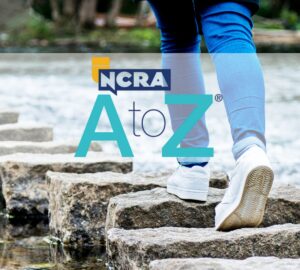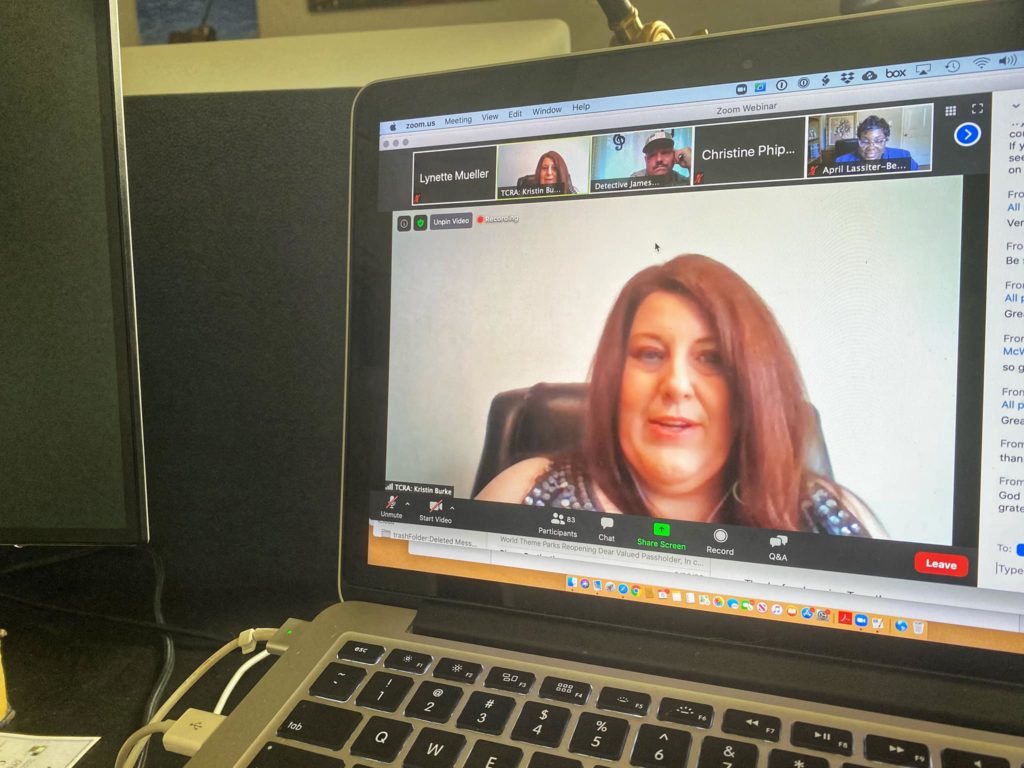
When the Tennessee Court Reporters Association decided to cancel their in-person convention, they quickly decided to move the event online. In an interview between Lynette L. Mueller, RDR, CRR, a freelancer reporter in Germantown, Tenn., and TCRA Convention Chairperson and President-elect Kristin Burke, a freelance reporter in Seymour, Tenn., we learn more about why they made the decision, the benefits of a virtual conference, and how they made it all work.
LM | When did you first realize that the convention you had been planning for wouldn’t be able to go forward because of the COVID-19 pandemic?
KB | We knew mid-March that any kind of in-person event was not going to take place. We had a previous convention and formed a good working relationship with our host hotel. In addition, our hotel contract included a force majeure clause, which allowed our [Tennessee] association to back out without financial penalty. An emergency meeting was called for our Convention Committee. The consensus of our Convention Committee members was that we should keep our convention alive by providing it on a webinar platform. We then sought our board’s approval to start a new plan immediately, and it was granted!
So back to work for the Convention Committee! We decided on our normal two-day format with the ability for our attendees to enjoy either one or two days. Each day would run consecutively, with short breaks in between each seminar, rather than breaking the day up and offering each seminar separately. We did record our non-NCRA seminars so that we can provide future CEU opportunities uploaded to our website for Tennessee licensed court reporters. Our Tennessee licensing board does allow for our association to offer these types of CEU opportunities.
LM | What was the deciding factor to go forward with your convention on a platform you had never used before?
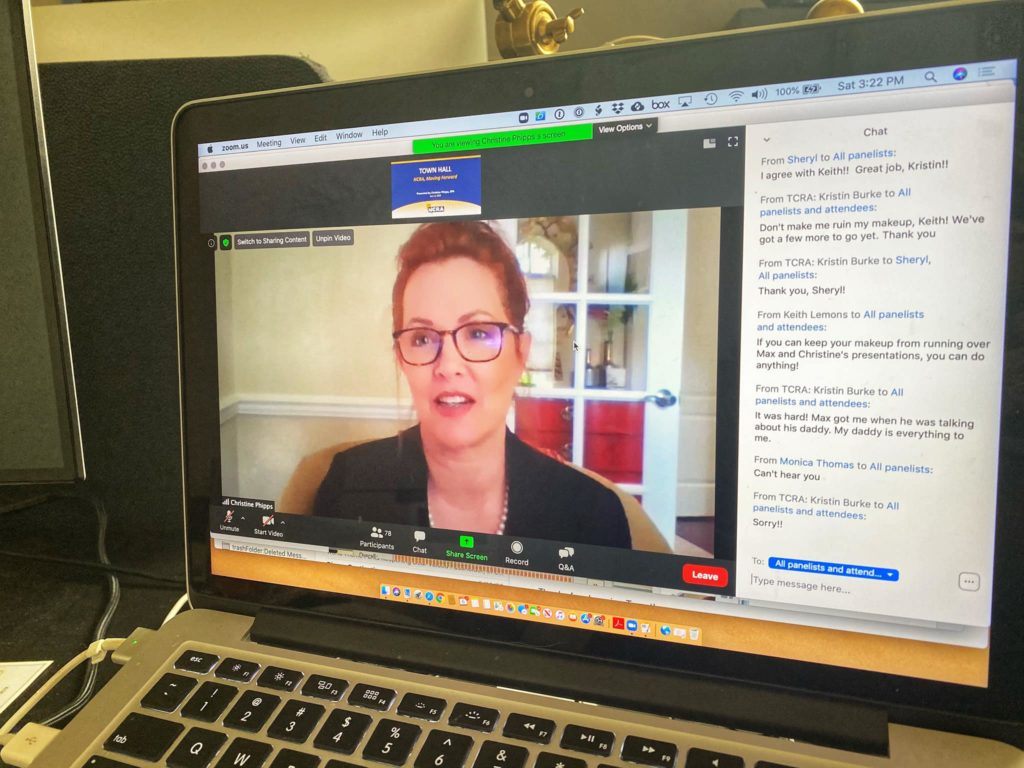
KB | We had already been brainstorming and thinking about streaming a portion of our convention to a few select people to test the waters, so to speak, on whether we could successfully pull off remote seminars in the future. That idea instantly became our new plan of action. Membership renewals and conventions are the backbone of our fiscal stability. The thought of not being able to keep our association financially sound definitely outweighed any fear or trepidation about utilizing a webinar platform for the first time.
Most court reporters were already somewhat familiar with Zoom in the work environment. It was a matter of taking advantage of the tutorial webinars offered by Zoom to gain the knowledge we needed to make this event a reality. We participated in webinars that explained the different registration options, including how to link payment options that our association already utilizes. These webinars also specifically addressed the differences in each role – host, co-host, panelist, and attendee – and the formulation of polls you can offer for each seminar. Our TCRA administrator made herself familiar with the many reports that can be obtained and how to use those reports for the purpose of tracking attendance for CEU credit purposes.
LM | Did you have to change your planned agenda in any way when moving from a live event to a webinar?
KB | Luckily, every one of our speakers slated for our convention had NCRA approval and was ready to take this leap forward with us! Unfortunately, our Annual Business Meeting always held during convention was not able to go forward. Our current bylaws do not allow for any voting to take place electronically. It was almost comical that a proposed bylaw amendment we had published to membership to be discussed and voted on at our ABM pertained to that exact situation. Our nomination slate for 2020-2021 could also not be voted on. The good news? Our association does have a bylaw mechanism in place that allows the remaining board members – president, past president, and directors – to approve a new slate, should a vote by the membership not take place.
Every year we provide a Town Hall that gives attendees the opportunity to discuss a variety of issues, but this year we couldn’t make it happen because of our virtual event. In a webinar setting, there are many controls available as the host. One of the controls is the ability to unmute an attendee or make them a panelist for the purpose of hearing and/or seeing them. The attendee would have to raise their virtual hand and you would have to take that step of unmuting and muting again for every attendee who wished to be heard. We felt monitoring the Q&A function and chat function for that type of discussion also had the possibility of interfering with someone being fully understood or being fully heard. Our intention was to keep the experience as inclusive and positive as possible without any possible time delays or confusing procedures.
We did engage in a panel discussion in our last seminar on Day 2. It was a five-person panel with some questions pre-submitted and some on the spot. One of our panelists acted as a moderator and kept their eye on the chat and Q&A functions. For the most part, it went smoothly, but there were instances where the question needed clarification. Court reporters are great typists, so we were able to overcome that obstacle with follow-up questions by the questioner. Of course, that then meant a reduction in time for further questions to be addressed.
LM | What were the procedures you implemented to make sure your event looked professional and ran efficiently?
KB | First, practice, practice, practice! We held practice sessions with every speaker. We addressed screen sharing for their presentations if needed. We discussed when they would take questions and how they wanted those questions presented to them. It was important to know what internet connection they were relying on and how they would look and sound on camera.
Our webinar host used two computers. One computer was utilized as the host computer. The other computer reflected a view as if the host was an attendee. That way, the host could see and monitor exactly what the attendees were seeing. That was a vital and important element to implement to ensure the speaker was pinned or that the Zoom software was in speaker view and not gallery view. Each speaker was designated as a panelist. In addition, certain committee members were also designated as panelists so that an introduction of speakers could be announced before each seminar. So long as the host enables the mute function of every panelist who does not need to speak and engages the speaker view option, the attendees can only view the current seminar speaker.

To give our webinar a more personal feel, the Convention Committee tasked Lynette Mueller to create a member video that was played between seminars. She was someone we had consulted with when discussing the move to a webinar platform. Lynette pulled pictures from past conventions, NCRA’s A to Z® Intro to Steno Machine Shorthand program classes, legislative successes, and career day events that highlighted our many beloved members! While we knew we couldn’t be physically present and together this year, the video afforded us the opportunity to enjoy reminiscing about our learning, networking, and personal friendships.
Every year our break sponsors assist by contributing funds to our association, thereby reducing catering costs. Because we had a virtual convention this year, ad sponsors were the solution to reducing our costs. A PowerPoint was created to include our ad sponsors. The PowerPoint was played during the breaks, along with other announcements.
LM | Now that your convention is behind you, what did you gain from this experience and would you do it again?
KB | Yes! We will definitely do this again. Our convention webinar was just as profitable as our live events and with none of the heavy lifting to worry about. Our attendees enjoyed the savings of no travel, hotel, or food expenses. It was great knowing our association could offer an affordable event and still benefit everyone at this most trying time when it was truly needed. Tennessee is a mandatory licensure state. Our renewal date is June 30, 2020. The fact that we were able to offer CEUs in time for that renewal date was extremely important to us.
We are amazed and thrilled that our inexperience was overcome by great speaker content and a professional-looking webinar. It didn’t happen by accident. With proper preparation and research, anyone can do what we did and be successful. One of the best features for our speakers and our webinar host was to be able to get feedback on their presentation in realtime. We had many, many attendees in the chat and Q&A functions of the Zoom platform write/state their appreciation and positive comments. It was invaluable information to have at our fingertips so that our speakers could reap that positivity immediately.
Thanks to the rest of our Convention Committee: Misty Brigham; Sarah Motley; Dana Webb; Sheila Wilson; April Lassiter-Benson; Jerri Porter, RPR, CRR; our TCRA Administrator, Lynn Terrell; and our consultant, Lynette Mueller.
LM | We hit a huge milestone and made history within our organization — our first ever webinar convention. Our convention theme this year was Passing the Torch. It was meant to celebrate and acknowledge our mentors, teachers, and accomplished colleagues in our profession, how their efforts and guidance have impacted us, collectively and individually, and how we keep those ideals moving forward. It falls in line with the Olympic motto “Citius – Altius – Fortius,” which means “Faster – Higher – Stronger.” Always moving forward, reaching further, and doing it together, that’s the goal. Tennessee did just that for this year’s convention!
For those states that are considering going online with your state convention, Tennessee urges you to take that plunge, take your learning event online, and go for it. They are happy to answer questions you may have if you’re on the fence about your decision to cancel your event or to go online. Send questions via email to administrator@tncra.com.


